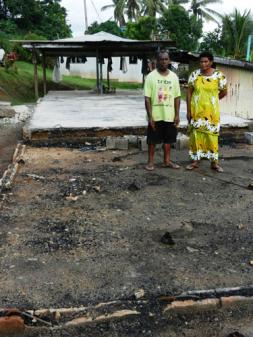Cyclone 2016: The death toll continues to rise in Fiji after Tropical Cyclone Winston made land tracking over the north coast of Viti Levu, Fiji, on February 20, 2016. Fijians took refuge from the cyclone that could prove to be the Pacific island nation's most powerful on record. Please keep the people of Fiji in your prayers.
 Climate Change and Fiji
Climate Change and Fiji
Our Pacific Islands are yours, O Lord,
And all the seas that surround them.
You made the palm trees grow
And the birds fly in the air.
When we see your beautiful rising run
And hear the waves splash on our shores,
When we see the moon rise,
We know, O Lord, how wonderful you are.
Watch over our people with justice;
Teach us righteousness,
Speak to us daily,
Strengthen us to serve you.
When I first read this prayer, I was reminded of the beauty of God’s creation all throughout the world. Although I have never been to the Pacific Islands, I can imagine how remarkable it must be to wake up next to the shore and smell the ocean, see the beautiful creatures and plants that live in tropical climates, and taste the unique traditional cuisine. Part of this great cluster of nations is Fiji, an island nation off the coast of New Zealand, known for its beautiful scenery, biodiversity, and tourism. Columbans have been active in Fiji since 1952, and began a lay missionary program in 1993. Since then, lay missionaries have focused on education and multiculturalism in the region.
Columbans have also been an essential part of relief efforts. During the flood in Fiji in 2012, Columbans opened up a food kitchen for people affected in the community. Unfortunately, Fijians are no strangers to natural disaster; tropical cyclones, El Nino events, and floods are common. This is not due solely to its location, but the disastrous effects of climate change - a phenomena that has impacted countless Fijians and the island nation’s wildlife. Coastal erosion, saline intrusion into freshwater sources, flooding are some of the environmental impacts, but the human impact as a result is devastating.
Fijians rely heavily on fisheries and crop production for export. Climate change has forever altered the availability of these resources, making it difficult for Fiji to sustain itself economically. Indigenous Fijians are very connected to the land culturally, so the erosion of these sites is a hindrance on traditional Fijian practices.
How can we be so careless in our treatment of earth in this delicate place ripe with the beauty of God’s creation? All of us contribute to climate change, and leave footprints of our own. We need to take action and realize how fragile our earth is; paying attention to our own impact. In the spirit of Bernard Narakobi’s prayer, I pray that God will watch over the people of Fiji with justice and hope that the distinct beauty and vitality of this area and its people will be protected.
 Elizabeth Nye is an Advocacy Associate for the Columban Center for Advocacy and Outreach in the USA.
Elizabeth Nye is an Advocacy Associate for the Columban Center for Advocacy and Outreach in the USA.